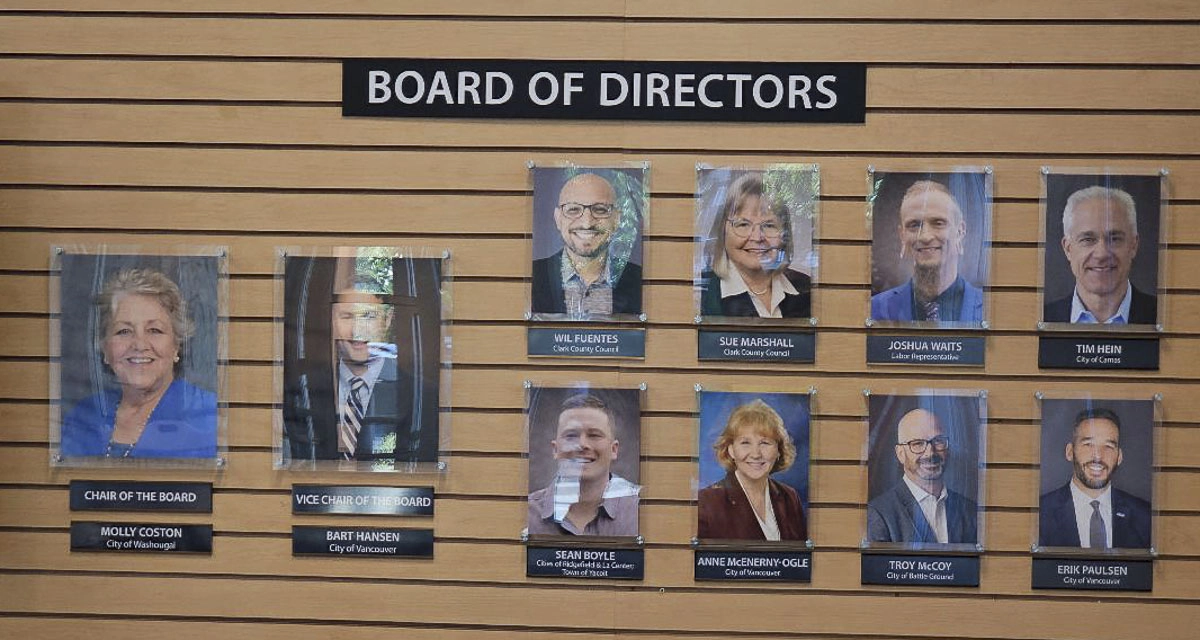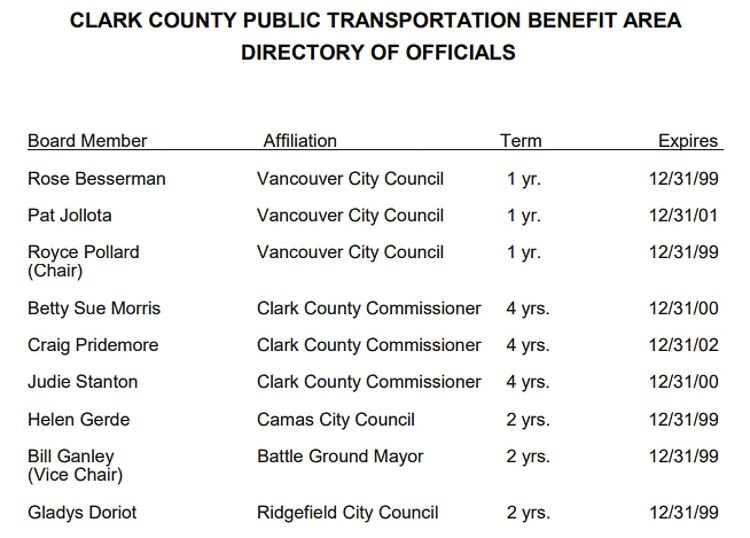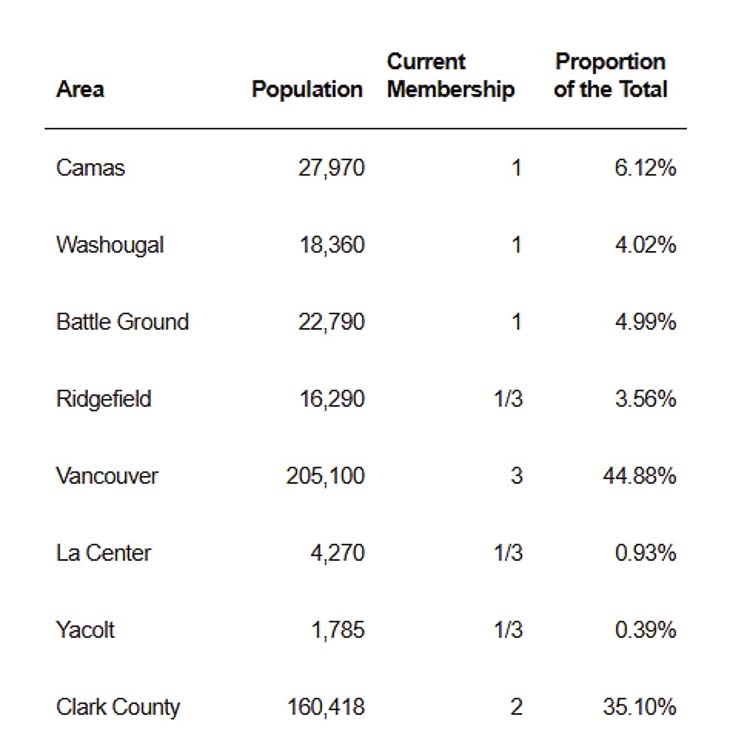Rep. John Ley
For Clark County Today
On Tuesday (Aug. 12), there will be a meeting to consider the composition of the C-TRAN Board of Directors. Each city from Clark County will send one representative, and all County Councilors will also be there. The issue: deciding the composition of the nine-member Board.
 Rep. John Ley
Rep. John Ley
At the July Board meeting, following an executive session, citizens were informed the Washington State Department of Transportation (WSDOT) had sent a letter indicating the present board was out of compliance with state law. Your board is underrepresented by the City of Vancouver and unincorporated portions of Clark County. Additionally, your board is overrepresented by cities with populations under 30,000 the letter states.
The risk to C-TRAN is not getting grant funding from the state. They are being asked to take action to ensure compliance with RCW 36.57.A.050 by Oct 1, 2025 to continue receiving grant funding.
 The current C-TRAN Board of Directors photos hang on the wall as you enter their headquarters building. Three members from the City of Vancouver, two members from the County Council, and four members from the small cities of Camas, Battle Ground, La Center, and Washougal. Photo courtesy John Ley
The current C-TRAN Board of Directors photos hang on the wall as you enter their headquarters building. Three members from the City of Vancouver, two members from the County Council, and four members from the small cities of Camas, Battle Ground, La Center, and Washougal. Photo courtesy John Ley
State law requires proportionality on transit boards; but no city may have a majority of board positions. The C-TRAN Board has nine members, therefore Vancouver can have a maximum of four seats. Presently the city of Vancouver has three seats, the Clark County Council has two seats, and the small cities of Battle Ground, Camas, La Center, Ridgefield, Washougal and Yacolt have four seats.
So who gains and who loses? Thats the $64 million question.
The current imbalance has existed since 2015. From 1999 to 2014, the proportional balance allocated three seats to the city of Vancouver, three seats to the County Council, and three seats to the small cities. If one third for the city, one third for the county, and one third for the small cities was fair since at least 1999, why shouldnt that allocation be fair going forward?
 The 1999 C-TRAN Board shows three members from Vancouver, three members from the County Council, and three members from the small cities who shared the position. Graphic courtesy C-TRAN
The 1999 C-TRAN Board shows three members from Vancouver, three members from the County Council, and three members from the small cities who shared the position. Graphic courtesy C-TRAN
The change in 2015 was led by the city of Vancouver wanting to reduce the influence of the Clark County Council at C-TRAN. They successfully removed one board seat from the county and gave it to the small cities.
Each city will have a single representative at the Tuesday evening meeting. The entire Clark County Council is allowed to attend. Theoretically, the rural parts of Clark County would be well represented by their members on the County Council.
But the politics of the Interstate 5 Bridge replacement project have tainted board proceedings since last November. In December the Board was stunned to hear TriMets light rail cost estimate, and a demand for C-TRAN to cover $7.2 million annually for the transit component of the I-5 Bridge replacement.
Things continued going south in January. Councilor Michelle Belkot made a motion to reconsider the November 2024 vote to allow discussion with TriMet regarding paying operations and maintenance costs associated with the MAX light rail extension into Vancouver. Her motion also rejected light rail for the project.
In March, it appeared Belkot and a majority of the Board were going to vote in favor of the resolution. The vote was postponed. County Chair Sue Marshall led an effort the next day to remove Belkot from her position on the C-TRAN Board. She was replaced by Councilor Wil Fuentes. A lawsuit has been filed against the County Council over this matter.
If one considers the population inside the C-TRAN Public Transportation Benefit Area (PBTA), Vancouver has the largest population. The city also receives the overwhelming majority of the service and benefit. C-TRAN operates 29 bus routes, all within the city of Vancouver. Ridgefield and La Center have route 48; Battle Ground and Yacolt have route 47; and Camas and Washougal have route 92.
Practically speaking, all county residents pay the 0.7 cent C-TRAN sales tax when they shop in the cities, not just those in the PBTA.
In 2024, OFM indicated the district had a population of 456,983. There are nine positions on the board, so each board member should be associated with 57,123 people. Using OFMs 2024 population for the cities, this is the current composition:
 The Office of Financial Management provided 2024 population numbers for each of the incorporated cities in Clark County and the Public Transportation Benefit Area, and unincorporated Clark County within the PBTA. Graphic courtesy John Ley
The Office of Financial Management provided 2024 population numbers for each of the incorporated cities in Clark County and the Public Transportation Benefit Area, and unincorporated Clark County within the PBTA. Graphic courtesy John Ley
Who will lose a seat? Camas and Washougal share a seat on the Regional Transportation Council (RTC) Board and a bus line. Should they share one seat on the C-TRAN Board? Battle Ground, Ridgefield, La Center, and Yacolt share a seat on RTC. Should they share a seat on C-TRAN?
There was an informal voice vote at the March C-TRAN Board meeting. Battle Ground, Camas, La Center, and Vancouvers Bart Hansen supported the Belkot motion. Its likely politics will come into play, as Vancouvers Mayor Anne McEnerny-Ogle tries to tip the scales of the pending vote to overturn her November reversal of the previous Board position against paying any light rail costs.
Tuesday evening, the Board meets at 5:30 p.m.. There is an Executive Session on the agenda, and opportunity for public comment. The choices made could determine the fate of C-TRANs support or opposition to the IBR.



